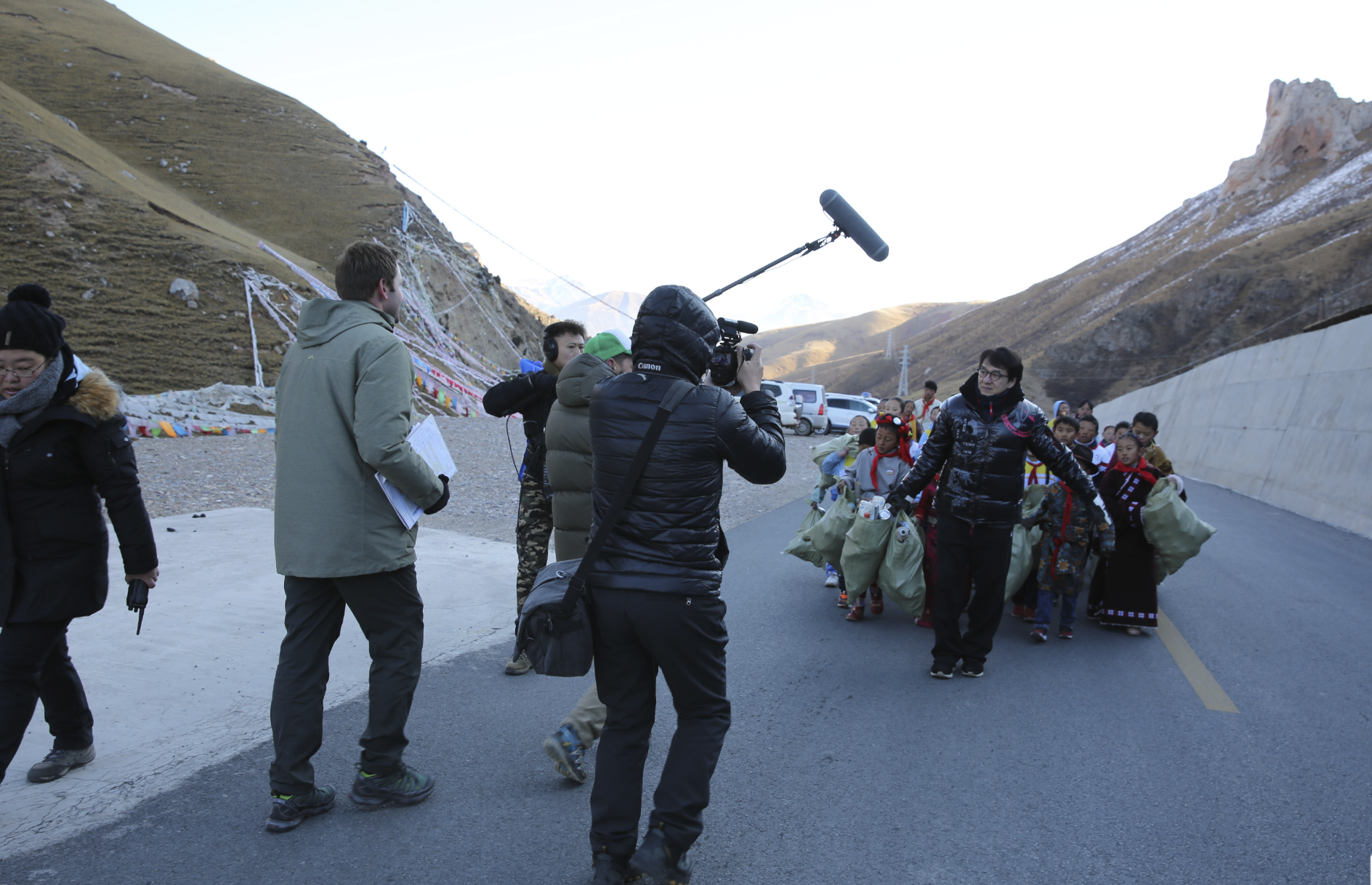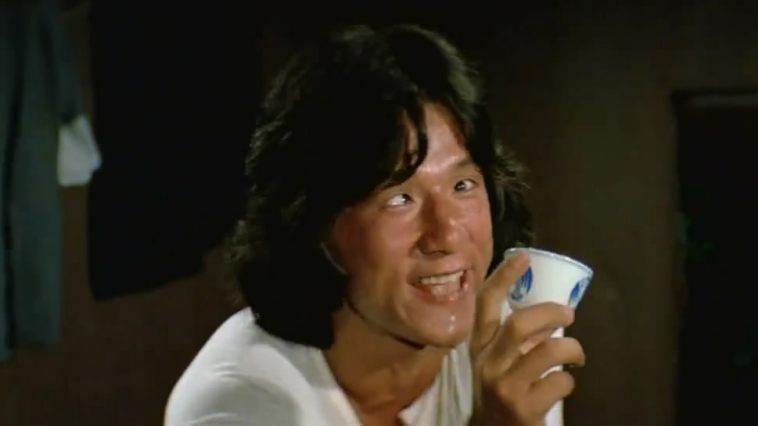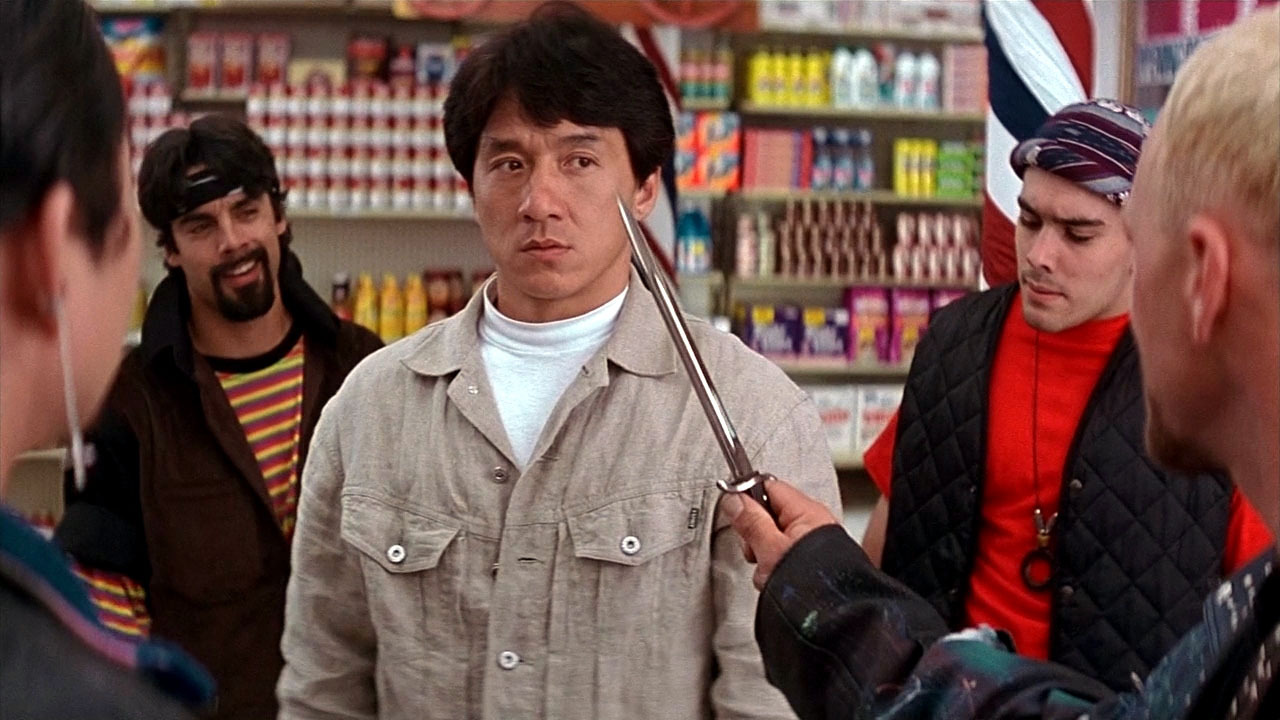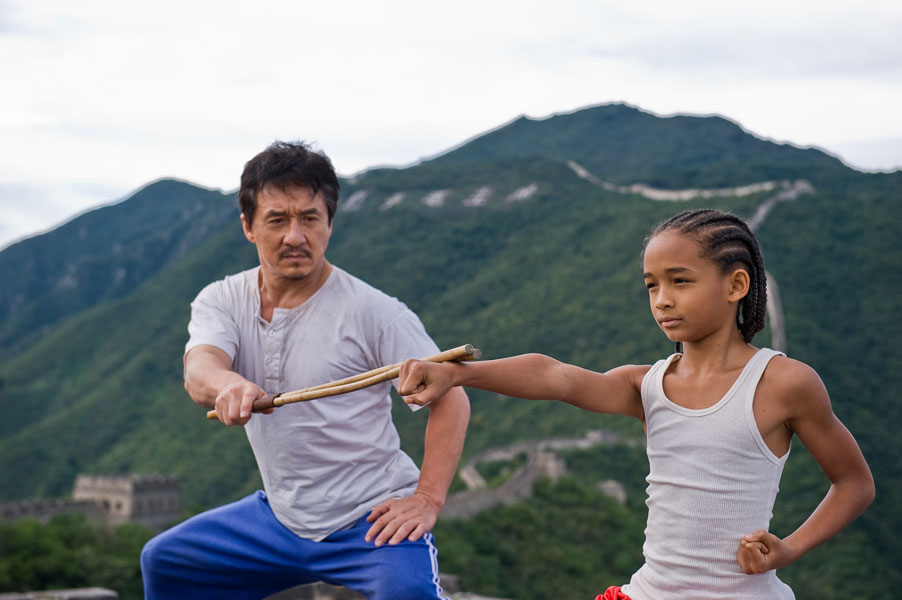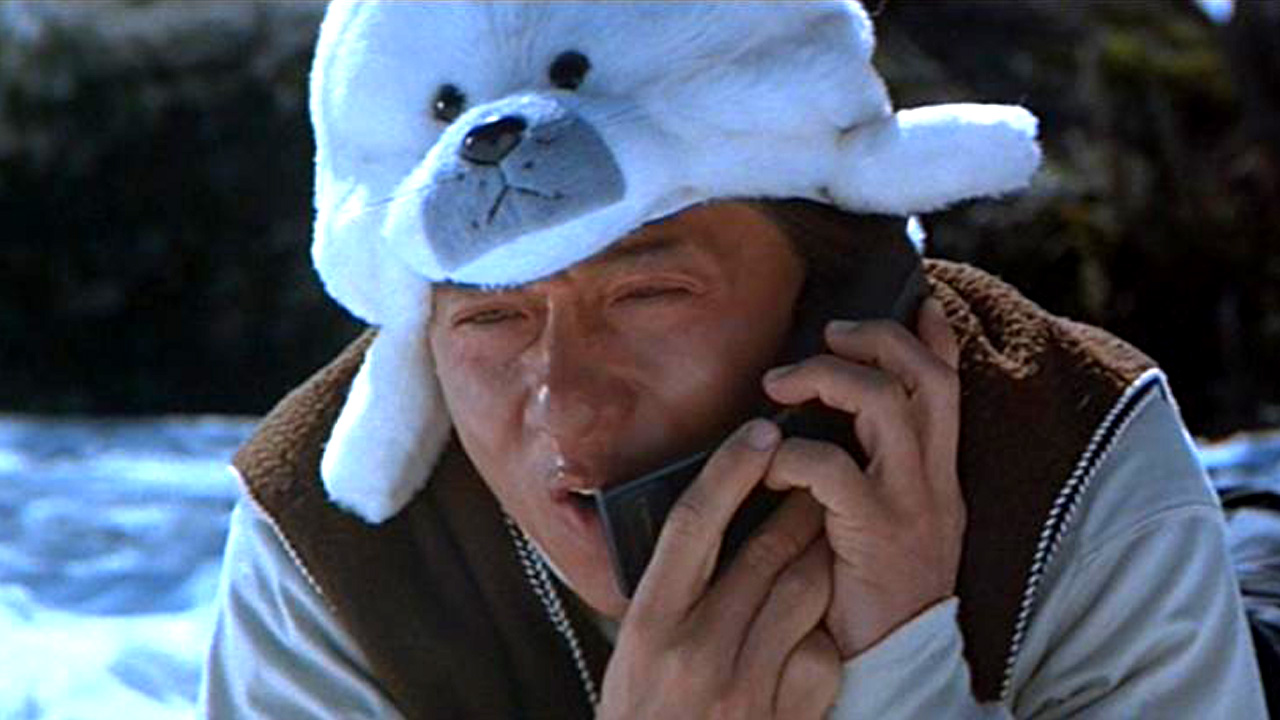Jackie Chan: I AM Green Hero
Jackie Chan receiving an honourary Academy Award (2016) - Photo by Frederick M. Brown/Getty Images Entertainment / Getty Images
Interview by Editor-In-Chief, Liberté Grace
Legendary actor Jackie Chan is reinventing his image as an iconic action hero.
The beloved Academy Award winner has starred in over 200 films that earned a combined two billion dollars in the box office, broke almost every bone in his body to do it, and only last month—almost died on the set of his latest film production.
Chan is his trademark exuberant self as he promotes his sustainable art exhibition of repurposed movie sets ‘Jackie Chan: Green Hero’ during the Sundance Film Festival.
But, as he sits down for an interview, in a surprisingly candid admission, he also expresses regret over the toxic alpha-male values within his earlier films, and wants his fans to heed this warning:
“Do not learn from me when I was young. Learn from me where I am now.”
Chan’s current mission is to prevent unnecessary environmental waste, through his National Geographic documentary and sustainable art exhibition; a philosophical and urgent call for Hollywood and all people who are willing—to take action to respect our planet and each other.
Jackie Chan at the opening of Jackie Chan: Green Hero exhibition, Leonardo Museum, Salt Lake City Utah
This could easily be mistaken for just another celebrity’s attempt at positive PR. Yet, as Chan moves effortlessly from one wide-eyed journalist to the next, it’s clear that his legendary persona neither needs nor craves such attention.
Instead, he appears to be seeking personal redemption, as he openly acknowledges the mistakes he made early in his career. Lowering his tone, he admits, “There’s a lot of pressure. Everybody looks at me as an idol. I know I’ve influenced a lot of young children around the world. So, that’s why, even in my movies, you’ll see they contain so many positive messages—not like the old days, when I didn’t care about the children and only cared about the box office.”
He continues, “If the action came through your butt, through your nose, through dirty movements, I used to think, ‘The audience is laughing. That’s good!’ But now, I think that was wrong. I didn’t know anything. I just wanted to make money and make a movie that the audience would like.”
“When the media said, ‘The box office is good. But, it’s cheap comedy with cheap action,’ I really accepted it. So, I slowly, slowly changed.”
When I ask why he now feels ready to be so open about his past, Chan reflects on his earliest days as a young, unknown actor—the son of Chinese refugees—a time he has previously described as his "wild days," when he would drink, gamble, and had become a millionaire by the age of 20.
As fearlessly as he tackles his stunts, he is equally unflinching in his honesty: "In the West, they don’t really know me that well. It’s only in the last 25 years that I became famous in America. Before those 25 years, no one knew what I was doing. Most people in Europe and America would say, ‘Oh, Jackie, you’re like Superman. So good!’ But nobody’s perfect. So, I wanted to show them how bad I was."
Jackie Chan: Green Hero exhibit press event - © I AM FILM 2019
When I ask why he now feels ready to be so open about his past, Chan reflects on his early days as a young, unknown actor—the son of Chinese refugees. He describes this period as his "wild days," when he would drink, gamble, and had become a millionaire by the age of 20.
As fearlessly as he tackles his stunts, he is equally unflinching in his honesty: “In the West, they don’t really know me that well. It’s only in the last 25 years that I became famous in America. Before those 25 years, no one knew what I was doing. Most people in Europe and America would say, ‘Oh, Jackie, you’re like Superman. So good!’ But nobody’s perfect. So, I wanted to show them how bad I was.”
“If you see rubbish on the street, you pick it up. That’s charity; that’s something every person should do.”
Reflecting on his early films, Chan explains how his approach to fame has become more conscious over the years: “When I was making a film, I just didn’t care about children or how I was influencing them. I was only thinking about myself. Now, after I make my films, I show them to my children and I think, ‘If I can show this to my children, I can show it to the whole world.’”
Chan’s entry into Hollywood not only brought him worldwide acclaim but also heightened his awareness of the enormous amount of waste generated on his movie sets. After noticing tens of thousands of plastic water bottles piling up on sets—many filmed in the world’s most remote locations—Chan began to search for ways to turn that waste into something useful.
Jackie Chan: Green Hero Exhibition, Leonardo Museum, Salt Lake City - courtesy of The Leonardo Museum
After participating in a panel discussion on environmental sustainability at The Leonardo Museum in Salt Lake City, Chan spoke about his lesser-known sustainable practices on movie sets:
“I’m an environmentally conscious person. On a typical set, when there’s a car crash, one car is destroyed—and that’s waste. You buy a new car. I try to use a seatbelt, do my best to stop waste, and reuse things on the set instead of just destroying them.
If you come to a Jackie Chan movie set, I have my own rules. Everyone has to think about waste; they have to write their names on their paper cups. I even have a place for you to put your own cup. If I can bring this kind of thinking to Utah and educate even two people, it’s worth it.”
Jackie Chan speaking at ‘FOCUS: Understanding Environmental Protection and Sustaining a Civilisation Through Reuse and Redesign’ in Salt Lake City, Utah - Courtesy of the Artist
It’s no exaggeration to say that Jackie Chan is one of the most uniquely recognised actors, bridging both Eastern and Western markets. So, it’s no surprise that another passion he wants to discuss is the value of cross-cultural collaboration.
On the topic of co-productions with China and the role they play in bringing different cultures together, Chan highlights the country’s growing theatrical market, with over 80,000 cinemas across the region:
“The whole world sees that, ‘Wow, China is the biggest market in the world for the future.’ So, there are so many Americans, Brits, Russians, Indians, Singaporeans—so many people are going to China to make co-productions.”
Rush Hour feat. Jackie Chan and Chris Tucker - Courtesy of New Line Cinema
“It’s like a big cake. Everybody’s trying to share the cake, and I think it’s a good thing. Why? Because, for example, with Rush Hour, we were trying to figure out how to collaborate between the East and West. More people are learning each other’s languages. If everyone understands each other’s culture, they’ll respect it.”
He continues, “Like Chris Tucker—when he was filming in China, he asked me, ‘Jackie, why does everybody say nigger on the set?’ And I explained, ‘Oh no, you misunderstand. Nahger means ‘there,’ or ‘that thing,’ or ‘that person’ in Chinese.’ There are so many of these kinds of misunderstandings.”
Chan reflects, “If he hadn’t asked me, he’d have been on his own, surrounded by so many Chinese people on the set, not wanting to say anything, and he would have been very unhappy. But after I explained, he said, ‘Oh, now I understand!’”
“So, through a movie—American culture, Indian culture, Korean, Japanese culture—everybody can understand everybody and there would be no more war going on. ”
Chan takes it a step further: "Sometimes, I see directors who make these incredibly violent films—people’s eyes popping out, all this gore—and they say, ‘Oh, the audience loves it.’ But when I ask them, ‘Would you show this to your family?’ they say, ‘Oh no!’ I say to them, ‘Why? Why make these kinds of movies, when there are so many other ways to tell a story?’”
He continues, “Like in Drunken Master, I would say, ‘Drunk. Drink. Fight!’ And then, I’d see children in Africa walking down the street, recognising me and repeating that. That’s when I realised how much influence I have on so many kids, and I really have to be careful.”
Chan explains the shift in his approach: “So, immediately, when I made Drunken Master II, the message changed to, ‘Don’t drink. Don’t fight. Respect your opponent. Respect the world. Respect everybody.’ Over the years, you can see how my films evolved. Even in Karate Kid I teach a simple lesson: ‘Turn on. Turn off. Turn on. Turn off’—the hot water, the idea of balance.”
“If you slowly watch my movies, there are so many messages,” Chan says. “Even in Rumble in the Bronx, for example. The casting director brought me a group of all black people for a scene, and I said, ‘No, what about the browns?’ He said, ‘In the Bronx, it’s all black people.’ I replied, ‘No, two is enough. The rest of the gang should be French, Italian, Chinese.’ He asked, ‘Why?’ And I said, ‘I want to show the world that bad people come from everywhere.’”
Chan continues, “And when my uncle got married to a black person in the film, I wrote that dialogue on purpose. My character says, ‘Why did you marry a black person?’ and the other character replies, ‘What does it mean? Black people, White people, Red people? In the future, there’s only one people: Earth people.’”
He adds, “For a long, long time, in my movies, I tried to communicate messages like these. In First Strike, my character is wanted by the police, and I deliberately chose a shot of a mother and child walking through a park. They see me on the front of a newspaper marked ‘Wanted.’ The mother drops the paper and runs away. I’m just passing by, so I pick up the newspaper and throw it in the garbage can. That’s the message I wanted to send."
“Why? I wanted to show that, no matter who you are, if you’re walking on the street, and you see rubbish - you should pick it up and put it in the garbage can. ”
“See, it’s not like you make rubbish in Utah and are clean in Hong Kong. No. The whole world belongs to humans. The whole world belongs to us, that’s my philosophy. Wherever I go, I just tell people we have to take care of it. Wherever I go, that belongs to me. That’s my philosophy.”
As our interview draws to a close, Chan is led to a Q&A with some local children eager to show off their Kung Fu moves. Watching him, I can’t help but sense his weariness with the expectation to perform his iconic Jackie Chan action hero persona.
Beyond the act, however, there’s a human being—a man who, despite his singular and legendary success, simply wants the freedom to express his true self without limitation and to find peace with his soul. “As an actor,” he says, “I want to do everything like Robert De Niro, Dustin Hoffman—that’s my goal.”
Perhaps this new evolution of Jackie Chan as a conscious ‘Green Hero’ is a perfect example of what’s possible for influencers in an age where trending authenticity is what truly resonates with the world.
Jackie Chan’s Green Heroes aired as a documentary episode on National Geographic. Chan’s exhibition at The Leonardo Museum continues until April 28th.
Special thanks to Daisy Hamilton at TriCoast Worldwide for making this piece possible.
You can follow I AM FILM on Instagram (iamfilmofficial) #IAMFILM #MastersOfFilm and Join our list to receive more news and views by the Masters Of Film at Sundance.
About the filmmaker
Jackie Chan
Actor, Producer, Activist
In the early 1970s Chan began in very minor roles in two films starring then rising martial arts superstar Bruce Lee: Fist of Fury (1972), and the Warner Bros. production Enter the Dragon (1973). Chan went on to appear in many successful martial arts films. He starred in Shaolin Wooden Men (1976), To Kill with Intrigue (1977), Half a Loaf of Kung Fu (1978) and Magnificent Bodyguards (1978). After scoring a major hit Drunken Master (1978), Chan made his directorial debut with The Young Master (1980). Chan caught the attention of the US market in Police Story (1985) (aka "Police Story") and starred in the Raiders of the Lost Ark (1981)-influenced Armour of God (1986), Project A 2 (1987), Police Story 2 (1988), Mr. Canton and Lady Rose (1989), Armour of God 2: Operation Condor (1991) and Police Story 3: Super Cop (1992), which were all sizable hits, escalating his status to phenomenal heights in Asia. His first US hit Rumble in the Bronx (1995) was quickly followed by Police Story 4: First Strike (1996), Mr. Nice Guy (1997), Who Am I? (1998), which were international box office successes. Chan then starred in his biggest-budget US production, alongside comedian Chris Tucker in the action / comedy Rush Hour (1998). He went on to be paired with Owen Wilson in Shanghai Noon (2000) and its sequel, Shanghai Knights (2003), and re-teamed with Tucker in Rush Hour 2 (2001), as well as starring in The Tuxedo (2002), The Medallion (2003) and Around the World in 80 Days (2004). Chan finally received an honourary Oscar in 2016 for his legendary career starring in over 200 films. Offscreen, Chan is a UNICEF GoodWill Ambassador, and he has campaigned against animal abuse and pollution and assisted with disaster relief efforts to the 2004 Indian Ocean Tsunami victims. Today, Chan champions environmental causes around the world.




